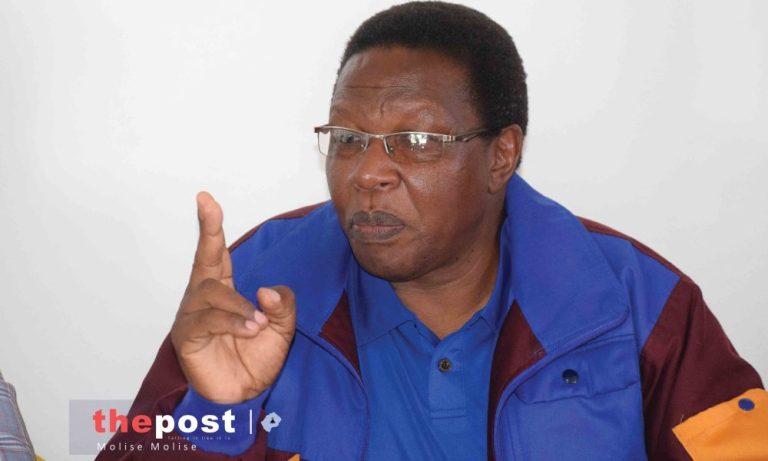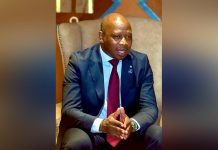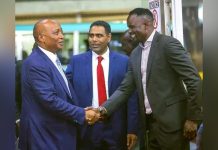Africa-Press – Lesotho. On March 29, 2023, Dr Tšepo Lipholo, the leader of the opposition Basotho Covenant Movement (BCM), the sole representative of his party, tabled a motion in Lesotho’s 120-member National Assembly exhorting the august body to reclaim parts of South Africa and declare them as part of Lesotho on the basis of two main grounds.
The first motivation for the motion is premised on section 1(2) of Lesotho’s 1993 Constitution, which reads “the territory of Lesotho shall comprise all the areas that immediately before 4th October 1966 were comprised in the former Colony of Basutoland together with such other areas as may from time to time be declared by an Act of Parliament to form part of Lesotho”.
The second rationale used by Dr. Lipholo is cited as the 1817 (XVII) Resolution of the 1196 Plenary Session of the United Nations General Assembly (UNGA) on the Question of Basutoland, Bechuanaland and Swaziland adopted on December 18, 1962.
In that Resolution, the UNGA requested Britain, the then colonial power administering these three countries, to “take immediate steps to return to the indigenous inhabitants all the land taken from them, whatever the form or pretext for such alienation”.
In the same Resolution, the UNGA declared that “any attempt to annex Basutoland, Bechuanaland and Swaziland, or to encroach upon their territorial integrity in any way, will be regarded by the United Nations as an act of aggression violating the Charter of the United Nations”.
It should be noted that much as Lesotho is a member of the United Nations, it is also a member state of the African Union (AU). It is worth noting that in 1964, the Organisation of African Unity (OAU), a precursor to the AU, adopted the Cairo Declaration which sanctified colonial borders in Africa in an effort to avert inter-state conflicts and wars.
The tension between the 1962 UN Resolution and the AU stance on borders notwithstanding, Dr Lipholo seeks to implore the National Assembly to “declare the whole of the Free State, parts of the Northern Cape, parts of the Eastern Cape, parts of Mpumalanga and parts of Kwazulu-Natal as comprising the territory of the Kingdom of Lesotho”.
The National Assembly has not yet finalised its debate on this motion. It is anticipated that the parliamentary debate will continue once the National Assembly resumes business following the Easter Holiday recess.
Before adjourning for Easter, the National Assembly adopted a proposal by the representative of the Popular Front for Democracy (PFD), Advocate Lekhetho Rakuoane, that an adhoc Committee be established to work on this motion and report back to a full parliamentary session in due course.
I have been following this parliamentary debate as well as the media coverage of this issue with keen interest for three main reasons. Purely from an academic stand-point, the issue of Lesotho-South Africa relations is of great interest to me as one of my research areas for more than 30 years now.
I have done a lot of research work on migration flows from Lesotho to South Africa since 1987. I am currently undertaking research on free movement of persons across the common border of these countries within the framework of the 2018 Protocol to the Treaty Establishing the African Economic Community Relating to Free Movement of Persons, Right of Residence and Right of Establishment.
At a more personal level, I have lived in both Lesotho and South Africa and currently I occasionally commute between Maseru and Johannesburg given my role as the Visiting Professor at the Centre for African Diplomacy and Leadership and a Senior Research Fellow at the Institute for Pan-African Thought and Conversation, at the University of Johannesburg.
I know both countries fairly well. I am a Mosotho. But I also associate a lot with South Africans. I have, therefore, been quite intrigued by the existential challenges facing Lesotho, which is totally surrounded by South Africa. It is on the basis of these three reasons that I chose to write this opinion piece.
I must start by expressing my effusive gratitude to Professor Motlatsi Thabane, a good friend and comrade of mine, for the excellent historical perspective that he has provided on how Basotho lost their land to both the British and Afrikaners between the 1830s and 1860s until they were colonised by Britain (see thepost, Volume 9 Issue 14, April 6-12, 2023, pages 16-17).
This historical account is quintessentially important as background for any serious debate on Lesotho-South Africa relations. The debate so far in parliament lacks this rigorous historical grounding that is also periodised accordingly.
The parliamentary debate and the media coverage of this debate on the return of the Lesotho’s Conquered Territory from South Africa is an ancient issue.
One of the oldest political parties in Lesotho, the Basutoland Congress Party (BCP), which was established in 1952, has as its main slogan “Ea Khutla Naha, esita le Matekoane a eona” (loosely translated as the return of the conquered land and its dagga).
The BCP did not achieve this dream even during its tenure as the sole governing party between 1993 and 1997, when the BCP leader, Ntsu Mokhehle, broke away from the party he founded and established the Lesotho Congress Party (LCD).
On 28 July 1998, a BCP/LCD stalwart, the late Advocate Tankiso Hlaoli Hans Hlaoli (may his soul rest in peace), then a member of Senate, tabled a more or less similar motion in the Upper House. But the Conquered Territory was never reclaimed back to form part of the territory of the Kingdom of Lesotho.
This issue resurfaced again during the multi-stakeholder consultations of the 2017-2018 covering all the 10 districts of the country including the diaspora especially Basotho in South Africa on wide-ranging governance reforms.
The Multi-stakeholder National Dialogue Plenary II Report of November 2019, proposed a number of constitutional amendments. On the land question, the report proposed that Lesotho must reclaim its Conquered Territory.
The overall implementation of the recommendations of the Multi-stakeholder National Dialogue Plenary II report was the sole responsibility of the National Reforms Authority (NRA) established in 2019.
When the NRA’s time-frame expired in May 2022, one of the 10 outstanding tasks that it could not execute was to develop a Bill on the Conquered Territory.
If and when the current 11th Parliament completes the governance reform work started by the 10th Parliament, it is anticipated that the issue of the Conquered Territory will be dealt with.
However, when framing the issue as simply the Return of the Conquered Territory, this complex agenda of national significance is severely narrowed. The issue of the Conquered Territory should be discussed within a broader framing of the redefinition of bilateral relations between Lesotho and South Africa.
Therefore, the bigger agenda should be the redefinition of bilateral relations between the two countries, with the Conquered Territory as just one component of this agenda.
We were extremely excited and optimistic in the early 1990s when both Lesotho and South Africa underwent their historic political transitions, hoping that the new democratic governments would re-order their relations anew.
Lesotho transitioned from a no-party military regime to a multi-party constitutional democracy in 1993 under the BCP government. South Africa transitioned from the racist apartheid minority rule to a multi-party constitutional democracy in 1994 under the ANC government.
Part of our optimism emanated from the Freedom Charter adopted by the African National Congress (ANC) in Kliptown, Johannesburg, on 26 June 1955 which proclaimed that “the people of the protectorates of Basutoland, Bechuanaland and Swaziland shall be free to decide for themselves their own future”.
However, Lesotho’s leadership chose to maintain the status quo, which is marked by, inter alia, unfettered South Africa hegemony, domination and exploitation of Lesotho. Lesotho’s underdevelopment feeds South Africa’s development.
A perfect example here is the 1986 Lesotho Highlands Water Project which was initiated by the Lesotho military junta under enormous pressure of the apartheid regime using gunboat diplomacy, including the 1985 blockade of Lesotho, followed by the 1986 military coup that toppled Leabua Jonathan’s Basotho National Party (BNP) government.
In a short space of time following the Metsing Lekhanya-led military coup all South African political refugees, especially members of the ANC, were expelled from Lesotho.
Even much more importantly, this debate on Lesotho-South Africa relations must be people-owned, people-driven and people-centered. In contrast, to date, the debate has by far been elite-owned, elite-driven and elite-centered.
So long as this debate is confined within the four walls of the parliament, they remain elitist in both form and substance. Redefining Lesotho-South Africa relations requires a national consensus in Lesotho.
The Lesotho national consensus on the country’s relationship with South Africa should be arrived at through broad-based multi-stakeholder consultations covering all the 10 districts including targeted consultations with marginalised and vulnerable social groups such as women, youth, persons with disability etc.
Be that as it may, the national consensus in Lesotho should also incorporate the views of Basotho in South Africa. This is important given that while there are 2.2 million Basotho in Lesotho, there are about 6 million Basotho in South Africa.
The people’s voice on the issue of a redefined the Lesotho-South Africa relations is key in breaking the current impasse on this matter. Intriguingly, popular perceptions of the people on Lesotho-South Africa relations seem diametrically opposed to the views of the political elites in Lesotho.
While part of the political elite, especially those with links to the BCP political tradition tend to favour the Return of the Conquered Territory (disintegration of South Africa), a majority of Basotho tend to prefer dual citizenship, human treatment of Basotho in South Africa, as well as free movement of persons, goods and services across the common border (integration) predicated on Pan-Africanist unity and African Renaissance.
In its study (Dispatch No. 205, 15 May 2018), Afrobarometer found that (a) 77% of respondents favour dual citizenship between Lesotho and South Africa and (b) 52% prefer that Lesotho should be integrated into South Africa in order to improve the lives and livelihoods of Basotho. The above popular opinions on Lesotho-South Africa relations resonate with some of the perspectives from the intellectual community on this subject.
Following the conference organised by the Department of Political and Administrative Studies at the National University of Lesotho (NUL) in July 1990, with financial support from the Swedish International Development Agency (SIDA), Sehoai Santho and Professor Mafa Sejanamane co-edited a book entitled “Southern Africa After Apartheid: Prospects for the inner periphery in the 1990s”.
Published by the Southern African Political Economy Series (SAPES) Trust based in Harare, Zimbabwe, in 1991, the book has 14 chapters. Three (3) of these chapters (by Prof.
Tefetso Mothibe, Prof. Nqosa Mahao and Prof. Roger Southall) deal with possible scenarios for Lesotho’s survival in the post-apartheid era following the 1994 political transition and liberation.
Since the publication of this book, there was a hiatus of intellectual debate on this subject until the recent establishment of the NUL-based Academic Forum for the Development of Lesotho (AFDeL).
Thus far, AFDeL has organised two webinars in 2021 and 2022 respectively. The 2021 webinar addressed the theme “RSA-Lesotho Integration for Inclusive and Sustainable Development and a Lasting Political Stability in Lesotho”.
The 2022 webinar focused on “Lesotho and South Africa: A clarion Call for Pan-Africanist Future”. It is imperative that the people’s views and the analysis by Lesotho’s intellectual community are strongly mainstreamed in the conversations aimed at redefining Lesotho-South Africa relations.
If that happens, we are likely to witness a positive transformation in the narrative and substance of this debate. In that way, the debate is likely to focus on the real needs of the people and move away from mere rhetoric and demagogy typical of political posturing often associated with populists.
But so long as the political elite continue to monopolise this debate leaving the people and the intelligentsia at the periphery, the status quo ante is likely to remain as has been the case since the country’s independence in 1966.
If need be, the national consensus arrived at through broad-based and inclusive consultations at district and national levels (through dialogue) could also be sealed with a national referendum. In sum, let the people speak.
For More News And Analysis About Lesotho Follow Africa-Press






